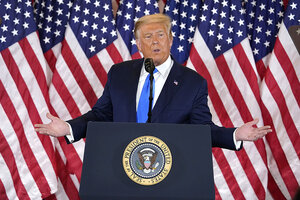Pro-Trump vote has world wondering: Do we still know America?

President Donald Trump alleged electoral fraud and called for a halt to the vote count early on Wednesday morning. His words spread alarm among international allies concerned for U.S. democracy.
Evan Vucci/AP
London
It was an extraordinary moment, and because it came just after the polls in America had closed, one that risks being lost in the continuing drama over who will emerge as the next president of the United States.
But it encapsulated the reasons why Washington’s long-standing allies overseas are concerned that President Donald Trump may have permanently eroded America’s decades-old position as the democratic world’s leader and exemplar.
The moment came in the early hours of Wednesday, in the East Room of the White House, when Mr. Trump made a preemptive declaration of victory in the presidential election and claimed that “a major fraud on the nation” was underway to steal that victory. He suggested that election officials across the country stop counting the many millions of votes yet to be processed.
Why We Wrote This
Whoever wins the White House, President Trump’s allegations of election fraud have dented America’s democratic reputation abroad. And the strength of his electoral support has given the world pause for thought.
Ordinarily, in what came to be known as the “democratic family of nations” in the post-World War II order moulded under U.S. leadership, a respectful diplomatic silence would have followed a presidential election. The accepted rule of thumb: Wait for the result, then congratulate and reach out to whoever has been elected to lead America for the next four years.
Not this time. Instead, European leaders and international poll watchers came out with comments that recalled the sort of remarks that they, and Washington, have often delivered in the wake of unfairly conducted votes in authoritarian states.
The head of an observer mission from the Organization for Security and Cooperation in Europe, which monitors polls internationally, said bluntly that “baseless allegations of systematic deficiencies, notably by the incumbent president ... harm public trust in democratic institutions.”
“What is important for us,” said German Finance Minister Olaf Scholz, “is that everything is counted out and that we have a clear result in the end that comes out of democratic elections, in democratic procedures.”
In Finland, a former prime minister, Alexander Stubb, tweeted that this was a “stress test for American democracy.” He said he still wanted “to believe in the resilience of its democratic institutions, but [I] am worried about the speech we just heard.”
Officials at the 27-nation European Union in Brussels also signaled concern. “We are awaiting that the authorities in charge of the vote-count announce the results,” a spokesperson for the European Commission said the morning after Mr. Trump’s remarks. “We will abide by whatever announcement is forthcoming officially by the relevant U.S. authorities, and we think that everybody should do likewise.”
Behind the response lay a mix of shock and dismay in Europe at the strength of the pro-Trump vote. The president’s solid support indicated that his election in 2016 was not the aberration most European leaders had thought it was, and laid bare the possibility that they had fundamentally misunderstood the current political and social nature of the United States.
A Trump victory “would challenge us fundamentally, in a way for which we are not yet prepared,” tweeted Norbert Röttgen, chair of the foreign affairs committee in the German parliament.
While a small number of right-wing populist European leaders do back Mr. Trump – Slovenia’s Prime Minister Janez Jansa, for instance, and Viktor Orbán, head of Hungary’s self-proclaimed “illiberal democracy” – most have been holding their collective breath in the hope of a Biden victory.
But they are skeptical about how far even a Democratic administration under Joe Biden would go toward reestablishing the old transatlantic alliance. Washington’s foreign-policy focus has been shifting eastward, toward its growing economic and geopolitical rivalry with China, since former President Barack Obama’s term of office.
Mr. Biden’s Democratic Party also includes a strong current of opposition to free-trade agreements; the expectation is that a Biden administration would focus inward, to deal with the many domestic challenges it would clearly face.
Still, the hope of most European leaders in the run-up to Election Day was that at least some key elements of their alliance with the U.S. would be repaired under a Biden presidency: stability, predictability, communication, consultation, and mutual respect.
And on one specific policy front, they do expect an early change if Mr. Biden wins.
The day after the election, Mr. Trump’s withdrawal of the U.S. from the international Paris Agreement on climate change took formal effect. Mr. Biden has pledged to reverse that, and to reengage in efforts to combat global warming.
But beyond that? Many of the political calculations in Europe, and among other U.S. allies in the world, have been newly unsettled in recent days, because of the twin impact of Mr. Trump’s postelection remarks and the size of Mr. Trump’s continuing electoral support.
An editorial comment in Stuff, the largest online news site in New Zealand, captured the mood in many capitals. “That so many voters in the U.S. were willing to have another four years of Trump,” it read, “should cause all of us to rethink our assumptions.”

